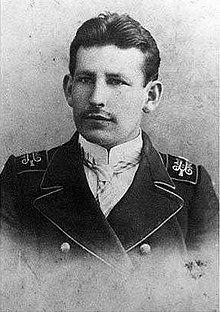Wazlau Iwanouski
Wazlau Iwanouski ( Belarusian Вацлаў Іваноўскі ; born May 25, 1880 in Ljabjoeda, Shchuchyn Rajon ; † December 7, 1943 in Minsk ) was a Belarusian social and political activist. Under German occupation he was mayor of the city of Minsk.
Life
Wazlau Iwanouski was born as one of five children. His father Leonard was gente Polonus, natione Lituanus (Pole with Lithuanian nationality) and owned lands in Ljabjoeda. In 1891 the family moved to Warsaw to send the children to school there. Iwanouski graduated from the boys' high school in 1899. His brother Jerzy became Polish Minister for Trade and Industry in November 1918. In 1904 Iwanouski completed his studies at the Technological University in Saint Petersburg , where he worked initially as a teaching assistant and after receiving his doctorate as an assistant professor. In 1902 Iwanouski founded the Belarusian Revolutionary Party together with Alexander Ulaslau and the brothers Anton and Iwan Lutkewitsch and later headed the Belarusian Socialist Hramada . In 1903 he began to publish partly illegal publications in Saint Petersburg. He published literature under the title Belarusian People's Education Group, which dealt with Belarusian history , traditions and culture. In 1906 Iwanouski founded an official publishing house in Saint Petersburg with the title The sun will also shine in our window and also wrote for the newspaper Nascha Niwa . In 1912 he founded a Belarusian publishing house in Vilnius . During the First World War , Iwanouski headed an aid committee for war victims. He managed to free himself from the arrest by the Bolsheviks and to continue his journalistic activities.
With the proclamation of the Belarusian People's Republic , Ivanousky became Minister of Education in Anton Lutskevich's cabinet and planned to found a university in Minsk. From March to October 1920 he was rector of the Pedagogical Institute in Minsk. With the end of the Polish-Soviet War in 1921, Iwanouski settled in Warsaw and in the autumn of 1922 took over the chair for food fermentation technology at the Technical University . In 1924 he became an associate professor and from 1935 a full professor. In the 1930s Iwanouski was the dean of the chemistry department, chairman of the Technical Military Academy in Warsaw and a member of the Senate of the Technical University. In September 1939, Iwanouski moved to Vilnius University , where he was able to teach chemical technology thanks to his brother Tadeusz , a zoology professor at Kaunas University.
As a result of Operation Barbarossa , the German occupiers allowed the reactivation of the Belarusian National Committee, which was headed by Iwanouski. In December 1941 he was appointed mayor of Minsk and followed the plans of General Commissioner Wilhelm Kube . Iwanouski became president of the Belorussian Trust Council founded in June 1943, the aim of which was to bring the interests of the Belarusian people closer to the German authorities. He also became President of the Belarusian Scientific Society and was present at Wilhelm Kube's funeral in Berlin . According to the official version, Ivanouski fell victim to an assassination attempt by the Soviet underground in December 1943 .
Individual evidence
- ^ Wojciech Roszkowski, Jan Kofman: Biographical Dictionary of Central and Eastern Europe in the Twentieth Century. London, Routledge 2015. p. 380. ISBN 978-0-7656-1027-0 .
| personal data | |
|---|---|
| SURNAME | Iwanouski, Wazlau |
| ALTERNATIVE NAMES | Іваноўскі, Вацлаў (Belarusian) |
| BRIEF DESCRIPTION | Belarusian social and political activist |
| DATE OF BIRTH | May 25, 1880 |
| PLACE OF BIRTH | Ljabjoeda, Shchuchyn Raion |
| DATE OF DEATH | December 7, 1943 |
| Place of death | Minsk |

